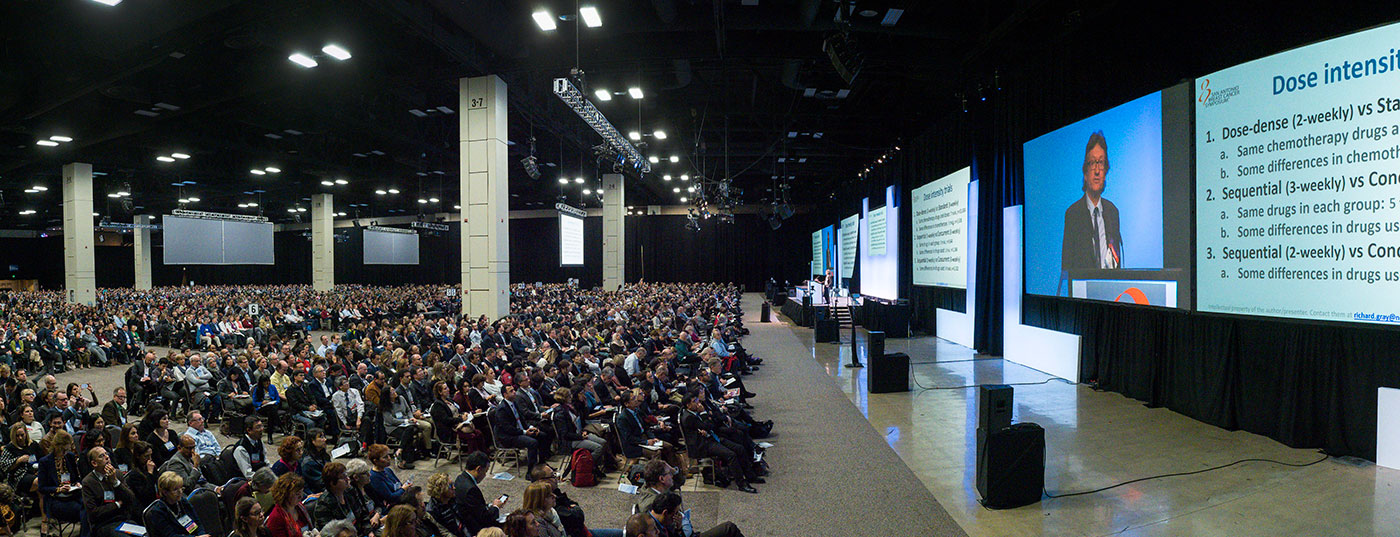Breast cancer remains the most common cancer in women and accounts for approximately one in five cancer-associated deaths. Regarding the relationship between weight loss and breast cancer risk, a study now provided insight at the San Antonio Breast Cancer Symposium in Texas.
Breast cancer remains the most common cancer in women. Despite ever-improving therapy and steady declines in death rates since 1985, breast carcinoma continues to account for approximately one in five cancer-associated deaths [2]. Effective primary prevention is therefore of great importance. Prof. Rowan Chlebowski, M.D., Department of Medical Oncology and Therapeutics Research at the City of Hope in Duarte, California, USA, presented an analysis of data from the Women’s Health Initiative (WHI) Observational Study at the San Antonio Breast Cancer Symposium that provided positive results on the topic.
Women’s Health Initiative (WHI) Observational Study
The WHI Observational Study included 93 676 postmenopausal women aged 50 to 79 years. Participants were recruited at 40 different centers across the United States between 1993 and 1998. Exclusion occurred, among other things, when a disease was present that made an average life expectancy of three years unlikely. The aim of the study was to explore predictors and triggers of morbidity and mortality in postmenopausal women as well as to act as a control for the WHI clinical trial [3].
If there was evidence of an unremarkable mammogram, a negative medical history for the presence of breast carcinoma, and a BMI ≥18.5 kg/m2, the data of the respective subjects were included in the current evaluation by Prof. Chlebowski. At the beginning of the study and after three years, the height and weight of the subjects were recorded.
Chlebowski’s study
The final cohort used for Prof. Chlebowski’s evaluation consisted of 61 335 women [4]. 41% were normal weight at baseline, 34% overweight, and 25% obese.
A follow-up was conducted after three years. Weight trends were evaluated and women were categorized as having “weight stability” (≤5% change in weight, n=41,139), having “gained weight” (≥5% increase, n=12,021), and having “lost weight” (≥5% decrease, n=8175). The limit value was set at 5%, since a decrease of min. 5% weight could influence certain biochemical processes in the body that are suspected to be associated with cancer, the authors of the study said. In addition to monitoring weight history, questionnaires regarding medical history, medication, risk factors for breast cancer, and mammography frequency were also collected.
Effects of moderate weight loss
For evaluation, subjects were divided into four groups and their data were analyzed according to tumor subtype (hormone receptor and Her2/neu status), baseline BMI (normal, overweight, obese), age (50-<70 years), and ethnicity. There was no difference between the groups in this respect.
Over a median follow-up period of 11.4 years, during which women were screened annually for breast cancer, 3061 of the total 61,335 patients developed invasive breast cancer. This showed that compared to those subjects with a stable weight history, women who had lost ≥5% weight had a 12% reduced likelihood of developing breast cancer (HR=0.88, p=0.02). If weight loss of ≥15% had occurred, the risk was reduced by 37% (HR=0.63). There was no significant difference in breast cancer incidence and unintentional or intentional weight loss (HR=0.82 vs. 0.91, p=0.2).
Although weight gain (≥5%) was not associated with an overall higher risk of developing breast cancer (HR=1.02), women in this category had a greater than 50% increased risk of triple-negative breast cancer (HR=1.54).
Parallels in endometrial cancer
Similar results have been shown for endometrial carcinoma [5]. Postmenopausal women who lost ≥5% had a significantly lower risk of developing endometrial cancer compared with those with stable weight (HR=0.71). The clearest association was among obese women with intentional weight loss (HR=0.44).
Source: San Antonio Breast Cancer Symposium, December 5-9, 2017, San Antonio.
Literature:
- Swiss Federal Statistical Office: Health Determinants: Overweight. www.bfs.admin.ch/bfs/de/home/statistiken/gesundheit/determinanten/uebergewicht.html (as of 12/15/17)
- Federal Statistical Office: Specific Cancer Diseases. www.bfs.admin.ch/bfs/de/home/statistiken/gesundheit/gesundheitszustand/krankheiten/krebs/spezifische.html (as of 12/15/17)
- Langer RD, et al: The Women’s Health Initiative Observational Study: baseline characteristics of participants and reliability of baseline measures. Ann Epidemiol 2003; 13 (9 Suppl): S107-21.
- San Antonio Breast Cancer Symposium (SABCS) 2017: Abstract GS5-07. Presented December 8th, 2017.
- Luo J, Hendryx M, Chlebowski RT: Intentional weight loss and cancer risk. Oncotarget 2017; 8(47): 81719-81720.
InFo ONCOLOGY & HEMATOLOGY 2018; 6(1): 27-28.











